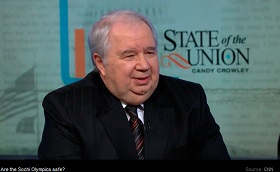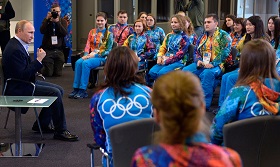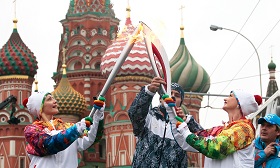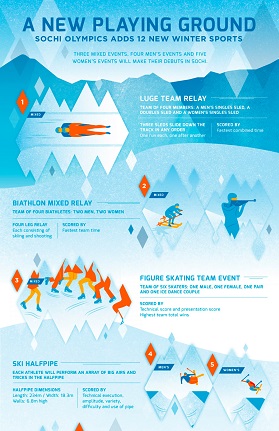The 2014 Sochi Olympics became more than a sporting event before it even started, acquiring a scope and importance within Russia that was unprecedented in the history of the modern Olympic movement. In this regard, Russia is very different from previous nations that have hosted the Winter Olympics, such as the United States, Italy, Canada and Japan. Each of these countries attempted to maximize their hosting of the Olympics in terms of international image, prestige, tourism dollars, and long-term investments into infrastructure - but never were forced to confront the types of issues that Russia was forced to consider.
The Sochi 2014 Winter Olympics represents an inflection point for Russia, a test of how the nation handles many challenges both domestically and abroad. The Olympic Games will test the ability of the leaders of the country and its citizens to provide adequate answers to these challenges.
Of course, the primary challenge is related to the prestige, image and global reputation of Russia. There is hardly a country in the world where there could be so many controversial items that could impact a nation's reputation. On one hand, there is a perception of Russia as a partner and a country of opportunities. On the other hand, there are the old Cold War stereotypes and fears, combined with the inherent instability of hosting the Olympics in a region - the North Caucasus - where hostilities trace back almost to antiquity.
In addition to questions of Russia's reputation and prestige, there is an important foreign policy challenge. Hosting the Winter Olympics is in many ways an indicator of Russia's future ability to uphold its international obligations as well as to play an active role in resolving conflicts of both a regional and global scale. It is enough to recall the boycotts of the Summer Olympics in Moscow in 1980 and in Los Angeles in 1984, to understand the global context of Sochi 2014.
There is also an impressive list of domestic challenges, each of which seems to have acquired a greater than expected resonance. The challenges for Russia are extensive: managing the logistics of a mega-sporting event; allocating resources to meet the challenges of the many Olympic construction projects; managing the expectations of the now more open and outspoken Russian society; and preparing for the safety and security of guests and athletes, especially in the context of terrorist threats and the fragile political situation in the Caucasus.
On the eve of, and during the Olympics, even small failures in these areas will have a resonance far beyond Russia's borders. After the Winter Olympics, we will finally be able to judge the country's return on investment: Did Russia achieve at least a modest success - or did the country simply spend billions of dollars for a beautiful two-week holiday and a bunch of "white elephant" projects?
How Sochi Can Transform the Image of Russia
Let us start with the image of Russia abroad and its image in the international arena. Over the past 10-15 years, this image has changed dramatically. In the early 2000s, many people saw Russia as a fragile and unstable state. Its role in the world was regarded as limited at best, as the country was beset with a seemingly insurmountable set of domestic challenges.
At that time, scenarios for the future of Russia included risks due to the disintegration of the state, internal conflicts, and large ecological disasters caused by the nation's aging infrastructure. This shaped the perception of Russia as an inferior player in international relations. It was the image of a country that had experienced a great catastrophe, as if it had been devastated, which needed assistance, at best, and at worst, to be avoided or isolated.
And now the Olympic Games are in Russia? Sochi, city of the Olympics? Back in those difficult days, people abroad and within Russia would have hardly believed that this was ever possible.
The fact that in 2007 Russia won the right to host the Olympics proved one very important thing. Russia had somehow regained the world's trust. Russia began to be considered as a partner capable of implementing large-scale, long-term projects.
Of course, this did not happen at once. By the time that Sochi had won its Olympic bid, Russia had already announced a number of major long-term projects of regional and even global importance: new pipelines, modernization of the military satellite network, aeronautical projects with international cooperation, private business projects in the IT field, and many others.
Rapid economic growth led to an almost unprecedented integration with the world economy. Almost overnight, there were thousands of links that tied the country to the outside world. The victory of the Russian Olympic bid took place against the background of growth in many areas. This was an indicator of a new quality of relations between Russia and the world.
However, in image and reputational terms, there are a number of serious problems. The perception of Russia in many countries remains very eclectic, and sometimes confused. Old-fashioned notions of Russian culture from Tolstoy, Pushkin and Dostoevs ky are combined with extremely simplified patterns, which are substituted, only with new faces and characters.
The image of Russia is, in many ways, an image of extremes. Russia is authoritarian, imperial, corrupt, inconvenient, poor (but also rich), unpredictable, full of raw resources, one-dimensional, irregular, non-market oriented, destructive, and archaic, etc. This perception is shared by a large number of foreign and Russian journalists, experts and some political cliques. They are readily accepted by voters, TV viewers, and now, Internet users.
It would be a serious mistake to consider this situation as a kind of plot against the country. The image of a nation has many layers, and as a result, it is extremely difficult to change over-night. Its resistance to a changed reality can be very long and sustained. Thus, instead of looking for those to blame abroad, and within Russia itself, it is necessary to work consistently to improve the situation for the better.
The Sochi Olympics are one way to improve the situation for the better. In the modern age of the Internet and social networking, with the transparency and interactivity that they bring, it is possible to challenge long-held myths and shatter prevailing stereotypes. By showcasing real work, real achievements, and world-class professionalism, the organizers of the Sochi Olympics are making it possible to present a new face of Russia to the world. As a result, Sochi 2014 will be a litmus test for the image of Russia, a test of how well its new image will play to global audiences.
The Link Between the Sochi Olympics and Russian Foreign Policy
For all the importance of changing the reputation and the international image of Russia, the Olympics also call into question more fundamental problems about the role and place of Russia in the world, its future prospects in the international arena, and its specific relationships with countries in both Europe and Asia.
Having won the bid to host the Olympic Games in Sochi, Russia found itself in a somewhat vulnerable position. A $50 billion investment in hosting the Games could have been wasted if several countries chose to boycott or refuse to participate in the competition for any number of reasons.
And there were more than enough reasons mentioned in the media: Russia's firm position on the Syrian issue, the crisis in Ukraine, the consequences of a military conflict with Georgia in 2008, not to mention the smaller, but still high-profile events like the restrictions on LGBT rights within Russia or the controversy surrounding Pussy Riot.
Importantly, Russia still has not yet fully formed its foreign policy identity - it is still looking for some consensus about its role and place in the world order. This search for an identity is superimposed on the remaining vestiges of the Cold War, at a time when the modern world order is marked by fragility and formlessness. Taking into account the so-called "compres-sion" of the historical process, when the situation in the world is changing very fast, changing a nation's foreign policy identity becomes even more difficult.
Against this background, on the tactical and operational level of Russian diplomacy (both state and public), a number of important successes were achieved. In almost every complex international dilemma of the passing year, Russia offered constructive and feasible solutions, acting as an effective mediator and managing to avoid a zero-sum mentality.
This is a fundamentally new quality of Russian diplomacy, something difficult to realize or even imagine in an era of bipolarity. Russia prevented intervention by external forces in Syria, which would inevitably have led to an escalation of the internal conflict. Russia contributed to significant progress in resolving the Iranian nuclear issue. Russia continued to actively assist the international community in solving the Afghan problem. Russia also managed to promote new integration processes in the CIS countries. The process of normalization of relations with Georgia - important for a successful Olympic Games in terms of security - has started.
In other words, in a fairly difficult international environment, Russian diplomacy has created the most favorable environment for the Olympics. Ignoring the Games for political reasons is not possible for any foreign governments at the moment.
The Olympics symbolizes Russia's increased role in international affairs. Sochi 2014 is a symbol of how relations between Russia and the world have changed over the last decade. How-ever, the Olympics is simultaneously a reminder that Moscow will require new approaches, new resources, and technologies, to mature as a world power.
Internal Challenges to Hosting the Winter Olympics
Finally, it's important to consider Russia's domestic problems, many of which have received particular scrutiny in connection with the Olympics. Many of these are most closely associated with the global and regional perspectives about Russia.
Sochi: Will Russia benefit from the 2014 Winter Olympics? from russia direct on Vimeo.
Russia Direct: Interview with Ivan Timofeev. Sochi: Will Russia benefit from the 2014 Winter Olympics?.
The first problem is related to security issues. Holding the Olympics in the North Caucasus has become a serious challenge to the Russian leadership. Security threats in the region are well known. The fundamental problems of unemployment, inequality, and corruption that can create a breeding ground for terrorist activity, radicalism and crime remain unsolved. How Russia answers these problems will go a long way in determining the future prospects of Sochi as a globally attractive city.
Another problem is associated with the effective use of the Olympics infrastructure after the end of the Winter Games. Here, there are two possible scenarios. In the first scenario, the new venues, ski resorts and stadiums enable Sochi to transform into a regional sports and tourism hub. Then there is the reverse scenario, very common for Olympic cities where sports and other infrastructure remain largely superfluous, transformed from an asset into a liability. The ability for Sochi to make the transformation into a regional and international hub is one way to judge the effectiveness of federal and regional policy.
Finally, another problem is related to the overall investment climate. Obviously, during the Games, the most convenient system will be implemented for the accommodation of visitors in Sochi. The question is - to what extent these conditions can be maintained after the Games? How long will it take to get a visa, what will be the quality of the service and attitude towards foreigners in an environment where the excitement about the Olympics subsides, volunteers and Olympic staff leave the city, and the attention of authorities is reoriented to other major sporting and political events?
Source: Russia Direct









